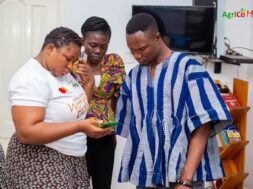On 15th August 2025, at the British Council in Ghana, Baobab Entrepreneur sat down with King David, a seasoned youth activist and strategic communication attaché to the African Union’s Office of the Commissioner for Health, Humanitarian Affairs, and Social Development. With over 20 years in youth activism and six years working directly with the AU, King David shared powerful insights on the intersection of youth empowerment, activism, and entrepreneurship in Africa.
His story is more than a personal journey—it is a call to action for young Africans to advocate for one another, pursue entrepreneurship with purpose, and turn challenges into opportunities.
The Power of Youth Activism
Advocating for Young People
King David stressed that “young people must advocate for young people.” For him, activism has not only shaped his career but also given him a deeper understanding of the struggles and potential of Africa’s youth.
This spirit of advocacy directly links to entrepreneurship in Ghana and Africa. Just as activists fight for change, entrepreneurs create solutions that address pressing social and economic needs. By advocating for each other, young people can amplify their voices and build stronger, more resilient communities.
Innovation and Potential
Africa is home to one of the world’s youngest populations, and King David emphasized that young people are naturally innovative and full of potential. From tech startups in Accra to creative businesses in Lagos, Africa’s youth are solving real problems every day.
The challenge, however, is ensuring that this potential is nurtured. With the right support—mentorship, training, and investment—youth-led businesses can grow into global success stories.
Entrepreneurship and Purpose-Driven Leadership
Think Globally, Start Locally
One of King David’s strongest messages was: “Think globally, start locally.”
For young entrepreneurs in Ghana and beyond, this means starting small but thinking big. By solving problems in their immediate communities—whether in agriculture, health, education, or digital services—young innovators can build businesses that scale across Africa and eventually compete globally.
This is also a reminder that profit must align with purpose. Entrepreneurship that is tied to impact will not only be sustainable but also transformative for society.
Turning Struggles into Motivation
Africa’s entrepreneurs face numerous challenges—funding gaps, regulatory hurdles, and infrastructure deficits. But King David urged young people not to let these struggles discourage them. Instead, they should use difficulties as fuel for innovation.
Across Ghana, examples abound: small businesses turning local products into export-ready goods, startups creating fintech solutions for unbanked populations, and social enterprises empowering women and people with disabilities. Each of these stories proves that resilience is a cornerstone of African entrepreneurship.
You can also read on: https://baobabentrepreneur.com/real-estate-and-construction-opportunities-in-ghana/
Building Together: Collaboration and Support
Peer Support and Networks
King David highlighted the importance of having each other’s back. In entrepreneurship, collaboration often beats competition. Networks, incubators, and hubs provide the space where young entrepreneurs can share knowledge, pool resources, and co-create solutions.
Platforms like Ghana Innovation Hubs, Mawutor Innovation Valley, and pan-African networks foster collaboration across industries and countries, making it easier for young people to thrive.
Access to Resources
Another key point was the importance of access to funding, mentorship, and partnerships. Organizations such as the African Union, GEPA, and private investors are increasingly providing platforms for youth businesses to flourish.
From microfinance for local traders to angel investment for tech startups, these resources help entrepreneurs grow and formalize their businesses.
The Future of Youth Entrepreneurship in Africa
Toward 2030
Looking ahead, King David believes that youth activism and entrepreneurship will define Africa’s economic future. With opportunities in technology, green business, and social enterprises, Africa’s next generation has the potential to create sustainable solutions for global markets.
The AfCFTA (African Continental Free Trade Area) presents even greater opportunities by opening up cross-border trade and enabling young entrepreneurs to scale beyond their home countries.
Call to Action
King David’s final words were both inspirational and practical:
“Think globally, start locally. Don’t be deterred by the struggles—let them motivate you. And above all, support one another, because when youth rise together, Africa rises.”
This message resonates deeply with Africa’s growing entrepreneurial ecosystem. For young people in Ghana and across the continent, the path forward is clear: build businesses with purpose, innovate with resilience, and grow together as a community.
Lessons for Young Entrepreneurs in Ghana and Africa
1. Purpose Must Drive Profit
The key to building sustainable businesses is to align profit with purpose. As King David emphasized, entrepreneurship is more than just making money—it’s about impact. Startups that link their business models to solving social or community issues are more likely to thrive long-term.
2. Advocacy as a Business Strategy
Youth activism teaches resilience, leadership, and empathy—all qualities that entrepreneurs need. By advocating for their peers, young business leaders not only create stronger networks but also inspire investor confidence and foster customer loyalty.
3. Innovation from Adversity
Africa’s challenges—whether access to capital, regulatory delays, or infrastructure gaps—should not be viewed as setbacks. Instead, they can spark innovation that addresses real problems. For example, mobile money in Ghana and Kenya was born out of the lack of traditional banking infrastructure.
4. Collaboration Over Competition
King David’s call to “have each other’s back” underscores the importance of collaboration. From co-working spaces to startup accelerators, the future of entrepreneurship lies in building communities, not silos. Entrepreneurs who share resources and knowledge are more likely to succeed.
Why This Matters Now
Africa is at a turning point. With over 400 million young people under 35, the continent’s demographic dividend could either become a burden or a blessing. King David’s story and advice highlight the path forward: empowered youth, purpose-driven businesses, and continental collaboration.
For Ghana in particular, with its growing middle class, stable democracy, and vibrant startup ecosystem, the opportunities for young entrepreneurs are immense. By leveraging AfCFTA, embracing digital tools, and nurturing social impact entrepreneurship, Ghanaian youth can lead Africa’s next wave of transformation.
Final Takeaway
King David’s two decades in youth activism and six years at the African Union carry a message of hope and urgency. His words—
“Think globally, start locally. Don’t let struggles deter you. Have each other’s back.”
—are not just advice, but a blueprint for the next generation of African entrepreneurs.
For every young person asking how to start a business in Ghana, grow it sustainably, and scale it across Africa, the lesson is clear: purpose, resilience, and collaboration will define your success.

















